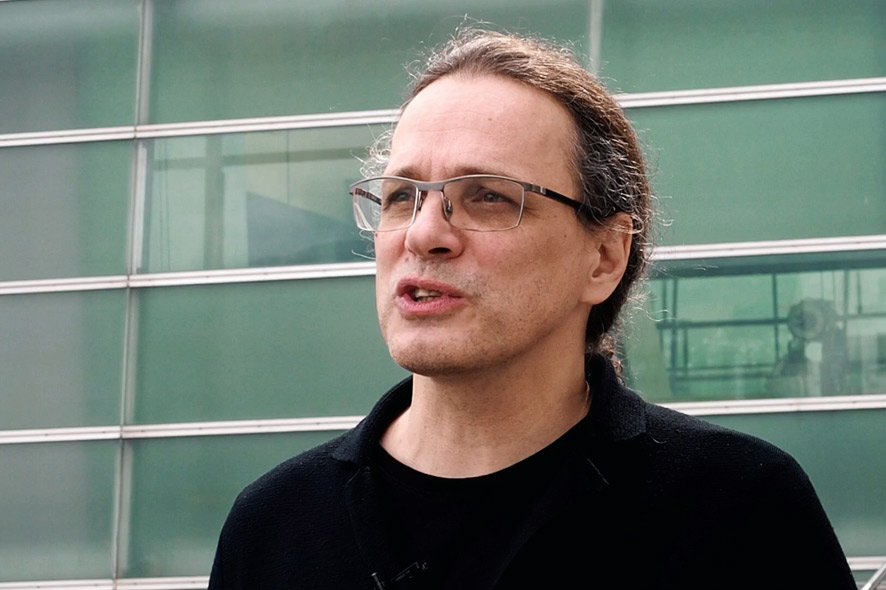The 2017 Ars Electronica Festival will feature symposia, exhibitions, performances, workshops and artistic interventions dealing with a subject of tremendous current relevance—artificial intelligence. This is a phenomenon that we human beings have created on our own, and a theme that, above all, prompts us to consider our own existence. So, why is this such a hot topic at the moment, and what exactly is this Other I? Shortly after announcing this year’s festival theme, Gerfried Stocker sat down with us to offer some insights.
Why is the Ars Electronica Festival addressing the subject of artificial intelligence at this particular time?
Gerfried Stocker: Technology is the leading issue of our time. And among the many hypes that are constantly emerging, artificial intelligence is #1 right now. On one hand, it’s really THE popular topic, but, on the other hand, it’s popular for a very good reason. After all, in light of the adaptive, self-learning machines that have come out in recent years, we’ve witnessed developments that don’t just exhibit enormous potential; they’re already realizing their capabilities. And the interesting thing about artificial intelligence is that it really does constitute something like a projection surface reflecting humankind’s always highly ambivalent attitude towards technology.
The questions that we can project onto this phenomenon—even though we’re all very well aware that it will still take decades to actually reach the point at which machines are brighter or more intelligent that human beings—the questions, the hopes and fears that we’re already projecting onto this surface are the essential questions of our society and our time. And I believe that thinking about and discussing artificial intelligence now also ultimately means reflecting on the current state of our high-tech society as a whole.
And what’s the significance of the “Other I” in this year’s festival theme?
Gerfried Stocker: We are intentionally juxtaposing the abbreviation AI with the phrase “The Other I” as an unmistakable declaration that we very much want to come to terms with these metaphysical questions too. This festival is an encounter with artificial intelligence, the adaptive systems and the autonomous mobile robots. But this is a whole thematic complex in which we are truly becoming enwrapped and that, of course, is now pelting us with all sorts of additional questions from all different angles.
“These are balls that are now on our side of the net, and we need to respond in kind and hit them back. So, this really should be configured as a dialog that delves into these questions.”
What does this mean for our self-conception as human beings? How far do we want to go? How justified are the anxieties and fears that many people have? And how can we deal with them constructively? In other words, we don’t even want to talk about artificial intelligence as science; instead, we want to focus on which dynamics, developments and discussions are being triggered by the fact that such an explosive technological development suddenly occupies the focal point of the social discourse?
““The Other I” is a reference to this projection that, at some point in the future, we will create something that can be like us human beings, and that we will, of course, also thereby have to conceive of a new dimension of being different, and this will be extremely difficult for us.”
We are also provocatively posing the question: How do propose to seriously deal with and coexist with this completely different reality of artificial intelligence when we can’t even manage to get along with human beings who have different colored skin, are affiliated with a different religion or come from a different cultural background, to treat them with dignity and live together with them? And I believe that these are the most exciting challenges that technology confronts us with in the cultural and social sphere. This should occupy the focal point of attention at the festival.
How does a human being differ from an artificially intelligent machine?
Gerfried Stocker: I believe there are two things you have to look at in considering this question of what is the exclusive purview of human beings. One is, as it were, the Blues of Our Existence. We humans will never know the meaning of life, where we come from and where we’re going. We will only ever find possible interpretations of this, but we will never know it for sure. The machines will always know it. This will be clearly imprinted in their logfile, which will contain the exact date, time and location at which the system was started up. That will bring with it a completely different view of the world.
Another interesting approach to this is to dispense with this hierarchical thinking as to which things we’ll be better at and, instead, to ask: What are the things that only we human beings need and that these machines of the future won’t need? That brings us to a very essential question of this day and age: The environment! We will always need pure water and clean air. The machines need electrical current and that’s about it.
The 2017 Ars Electronica Festival will be held September 7-11, 2017 in POSTCITY Linz. To find out more, go to ars.electronica.art/ai!
